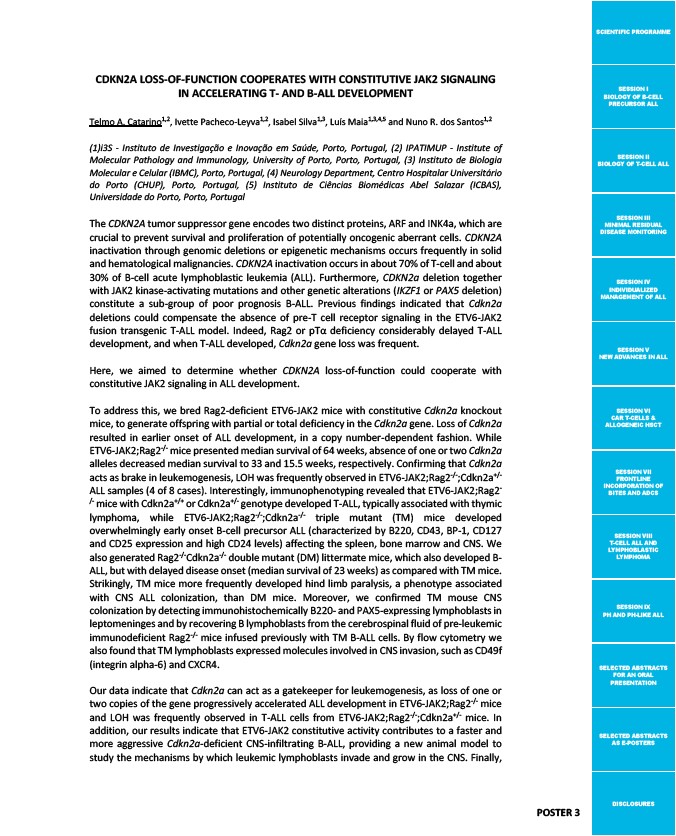
SCIENTIFIC PROGRAMME
SESSION I
BIOLOGY OF B-CELL
PRECURSOR ALL
SESSION II
BIOLOGY OF T-CELL ALL
SESSION III
MINIMAL RESIDUAL
DISEASE MONITORING
SESSION IV
INDIVIDUALIZED
MANAGEMENT OF ALL
SESSION V
NEW ADVANCES IN ALL
SESSION VI
CAR T-CELLS &
ALLOGENEIC HSCT
SESSION VII
FRONTLINE
INCORPORATION OF
BITES AND ADCS
SESSION VIII
T-CELL ALL AND
LYMPHOBLASTIC
LYMPHOMA
SESSION IX
PH AND PH-LIKE ALL
SELECTED ABSTRACTS
FOR AN ORAL
PRESENTATION
SELECTED ABSTRACTS
AS E-POSTERS
DISCLOSURES
CDKN2A LOSS-OF-FUNCTION COOPERATES WITH CONSTITUTIVE JAK2 SIGNALING
IN ACCELERATING T- AND B-ALL DEVELOPMENT
Telmo A. Catarino1,2, Ivette Pacheco-Leyva1,2, Isabel Silva1,3, Luís Maia1,3,4,5 and Nuno R. dos Santos1,2
(1)i3S - Instituto de Investigação e Inovação em Saúde, Porto, Portugal, (2) IPATIMUP - Institute of
Molecular Pathology and Immunology, University of Porto, Porto, Portugal, (3) Instituto de Biologia
Molecular e Celular (IBMC), Porto, Portugal, (4) Neurology Department, Centro Hospitalar Universitário
do Porto (CHUP), Porto, Portugal, (5) Instituto de Ciências Biomédicas Abel Salazar (ICBAS),
Universidade do Porto, Porto, Portugal
The CDKN2A tumor suppressor gene encodes two distinct proteins, ARF and INK4a, which are
crucial to prevent survival and proliferation of potentially oncogenic aberrant cells. CDKN2A
inactivation through genomic deletions or epigenetic mechanisms occurs frequently in solid
and hematological malignancies. CDKN2A inactivation occurs in about 70% of T-cell and about
30% of B-cell acute lymphoblastic leukemia (ALL). Furthermore, CDKN2a deletion together
with JAK2 kinase-activating mutations and other genetic alterations (IKZF1 or PAX5 deletion)
constitute a sub-group of poor prognosis B-ALL. Previous findings indicated that Cdkn2a
deletions could compensate the absence of pre-T cell receptor signaling in the ETV6-JAK2
fusion transgenic T-ALL model. Indeed, Rag2 or pTα deficiency considerably delayed T-ALL
development, and when T-ALL developed, Cdkn2a gene loss was frequent.
Here, we aimed to determine whether CDKN2A loss-of-function could cooperate with
constitutive JAK2 signaling in ALL development.
To address this, we bred Rag2-deficient ETV6-JAK2 mice with constitutive Cdkn2a knockout
mice, to generate offspring with partial or total deficiency in the Cdkn2a gene. Loss of Cdkn2a
resulted in earlier onset of ALL development, in a copy number-dependent fashion. While
ETV6-JAK2;Rag2-/- mice presented median survival of 64 weeks, absence of one or two Cdkn2a
alleles decreased median survival to 33 and 15.5 weeks, respectively. Confirming that Cdkn2a
acts as brake in leukemogenesis, LOH was frequently observed in ETV6-JAK2;Rag2-/-;Cdkn2a+/-
ALL samples (4 of 8 cases). Interestingly, immunophenotyping revealed that ETV6-JAK2;Rag2-
/- mice with Cdkn2a+/+ or Cdkn2a+/- genotype developed T-ALL, typically associated with thymic
lymphoma, while ETV6-JAK2;Rag2-/-;Cdkn2a-/- triple mutant (TM) mice developed
overwhelmingly early onset B-cell precursor ALL (characterized by B220, CD43, BP-1, CD127
and CD25 expression and high CD24 levels) affecting the spleen, bone marrow and CNS. We
also generated Rag2-/-Cdkn2a-/- double mutant (DM) littermate mice, which also developed B-ALL,
but with delayed disease onset (median survival of 23 weeks) as compared with TM mice.
Strikingly, TM mice more frequently developed hind limb paralysis, a phenotype associated
with CNS ALL colonization, than DM mice. Moreover, we confirmed TM mouse CNS
colonization by detecting immunohistochemically B220- and PAX5-expressing lymphoblasts in
leptomeninges and by recovering B lymphoblasts from the cerebrospinal fluid of pre-leukemic
immunodeficient Rag2-/- mice infused previously with TM B-ALL cells. By flow cytometry we
also found that TM lymphoblasts expressed molecules involved in CNS invasion, such as CD49f
(integrin alpha-6) and CXCR4.
Our data indicate that Cdkn2a can act as a gatekeeper for leukemogenesis, as loss of one or
two copies of the gene progressively accelerated ALL development in ETV6-JAK2;Rag2-/- mice
and LOH was frequently observed in T-ALL cells from ETV6-JAK2;Rag2-/-;Cdkn2a+/- mice. In
addition, our results indicate that ETV6-JAK2 constitutive activity contributes to a faster and
more aggressive Cdkn2a-deficient CNS-infiltrating B-ALL, providing a new animal model to
study the mechanisms by which leukemic lymphoblasts invade and grow in the CNS. Finally,
POSTER 3